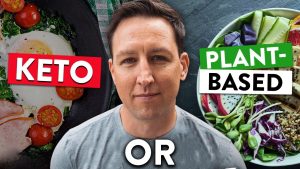Introduction
In today’s world, where wellness is at the forefront of our lives, making the right dietary choices is more important than ever. With so many diets to choose from, two that have gained immense popularity in recent years are the Keto and plant-based diets. These diets promise to offer health benefits, improve energy levels, and support weight management. But how do you decide which one is best for you in 2025? In this ultimate guide, we’ll explore both the Keto and plant-based diets, their benefits, challenges, and tips on how to incorporate them into your lifestyle. Whether you’re looking for better health, weight loss, or just trying something new, this guide will help you make an informed decision.
What is the Keto Diet?

The Keto diet, short for Ketogenic diet, is a high-fat, low-carbohydrate eating plan designed to shift your body into a state of ketosis. In this metabolic state, your body burns fat for fuel instead of carbohydrates, leading to faster fat loss. The Keto diet typically includes foods like meat, eggs, dairy, and healthy fats such as avocado and olive oil, while it drastically reduces carbohydrate intake.
Benefits of the Keto Diet
The Keto diet is known for its ability to help with weight loss and improved metabolic function. Here are some of the primary benefits:
- Weight Loss: By reducing carbohydrate intake, your body uses fat for energy, helping you burn fat more efficiently.
- Improved Mental Clarity: Many Keto dieters report better focus and mental clarity, as the brain uses ketones for energy, which is more efficient than glucose.
- Stable Blood Sugar Levels: Since the diet is low in carbohydrates, it helps stabilize blood sugar, making it a good option for those managing diabetes or insulin resistance.
However, it’s important to note that the Keto diet can be restrictive, and some people may struggle to maintain it long-term due to its limited food options.
What is a Plant-Based Diet?

A plant-based diet emphasizes foods that come primarily from plants. This includes not only fruits and vegetables but also nuts, seeds, whole grains, and legumes. Unlike veganism, which excludes all animal products, a plant-based diet can allow small amounts of animal products, but the focus is on plant-based foods for the majority of the meals.
Benefits of a Plant-Based Diet
Adopting a plant-based diet comes with numerous health benefits, including:
- Improved Heart Health: High in fiber and antioxidants, a plant-based diet is excellent for lowering cholesterol, reducing the risk of heart disease, and promoting overall cardiovascular health.
- Weight Management: Plant-based foods are generally lower in calories and higher in fiber, which helps with feeling fuller longer, aiding in weight management.
- Better Digestive Health: With an emphasis on fiber-rich foods, a plant-based diet promotes healthy digestion and can reduce symptoms like bloating and constipation.
- Reduced Risk of Chronic Diseases: Research has shown that plant-based diets can lower the risk of chronic conditions like type 2 diabetes, cancer, and obesity.
Despite its many health benefits, transitioning to a plant-based diet can be difficult, especially if you are accustomed to eating a lot of animal products. It also requires careful planning to ensure you’re getting all the necessary nutrients, such as protein and vitamin B12.
Comparative Table: Keto and Plant-Based Diets

Both the Keto diet and plant-based diet come with their own set of benefits, but the key to success is understanding how they align with your health goals. Let’s compare them side by side to help you make a more informed decision.
| Aspect | Keto Diet | Plant-Based Diet |
|---|---|---|
| Food Focus | High in fats, moderate protein, low carbs | Focus on fruits, vegetables, legumes, and grains |
| Main Goal | Induce ketosis to burn fat | Promote overall health and weight management |
| Health Benefits | Weight loss, better mental clarity, stable blood sugar | Heart health, weight management, reduced risk of chronic diseases |
| Challenges | Difficult to sustain, limited food choices | Requires careful planning for nutrient balance |
| Long-Term Sustainability | Difficult to maintain long-term | More sustainable in the long run |
Top Tips for Adopting Each Diet

Tips for Adopting the Keto Diet
-
Plan Your Meals: Since the Keto diet restricts many food groups, meal planning is key. Focus on high-quality fats like avocados, olive oil, and nuts, while incorporating protein from meat or plant-based sources.
-
Track Your Macronutrients: To ensure you stay in ketosis, track your fat, protein, and carbohydrate intake.
-
Stay Hydrated: A low-carb diet can lead to dehydration, so it’s essential to drink plenty of water.
Tips for Adopting a Plant-Based Diet
-
Start Slowly: Transitioning to a plant-based diet can be challenging. Begin by incorporating more plant-based meals into your week and gradually reduce your intake of animal products.
-
Diversify Your Protein Sources: Beans, lentils, tofu, and tempeh are excellent plant-based sources of protein.
-
Supplement Where Needed: Consider taking supplements for vitamin B12, vitamin D, and omega-3 fatty acids to ensure you’re getting all the nutrients you need.
The Future of Keto and Plant-Based Diets

The future of Keto and Plant-Based diets looks promising in 2025 and beyond. As more research is conducted, the benefits of these diets are becoming clearer, leading to more people adopting them. We are likely to see more plant-based food options in restaurants and grocery stores, as demand for plant-based alternatives continues to grow. With the rise of plant-based meat substitutes and keto-friendly snacks, it’s becoming easier to stick to these diets without feeling deprived. In the future, we may also see advancements in personalized nutrition, allowing individuals to tailor their diets even more precisely to their health needs, making these diets even more accessible and sustainable.
Conclusion
Both the Keto diet and the plant-based diet have unique benefits, but the best option for you depends on your personal health goals, preferences, and lifestyle. The Keto diet may be more suitable if you’re focused on weight loss and quick fat burning. However, if you are looking for long-term health benefits, better digestion, and heart health, a plant-based diet may be the better choice.
Ultimately, a balanced approach that combines elements of both diets could work well for many people, allowing you to experience the benefits of both worlds.
Call to Action
Interested in learning more about how to start a Keto or plant-based diet? Visit our website to explore delicious meal plans, recipes, and expert tips to help you succeed on your health journey today!




